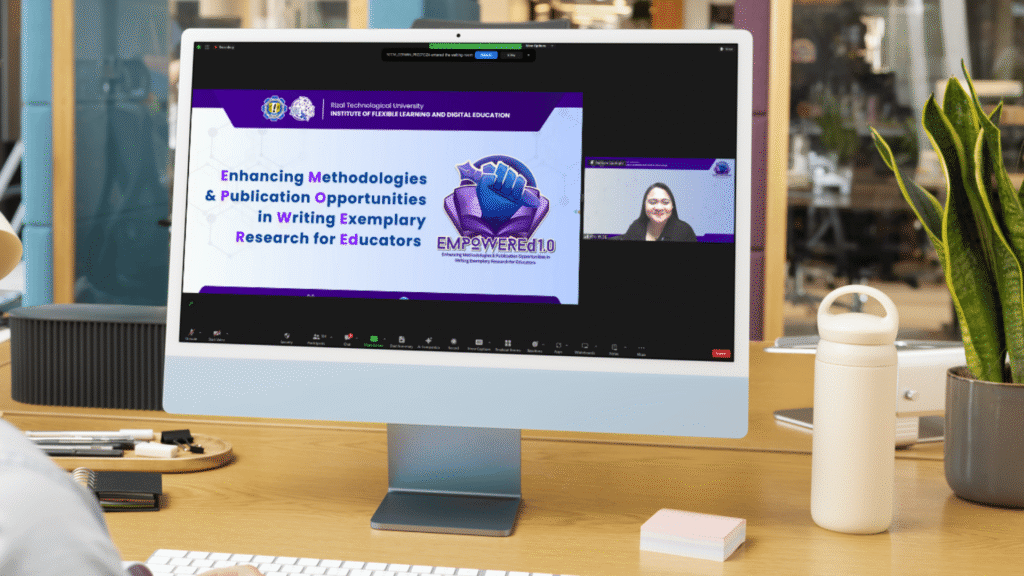“Publish or Perish” is a phrase popular among academics in recent years. This phrase encapsulates the collective sentiment of educators who must produce SCOPUS-indexed research papers or face career consequences.
To help educators nationwide with such a system, research experts from Rizal Technological University (RTU), facilitated by the Institute of Flexible Learning and Digital Education (IFLDE), launched EMPOWEREd 1.0, a webinar series featuring the expert knowledge of PhD holders from RTU. EMPOWEREd 1.0 (Enhancing Methodologies & Publication Opportunities in Writing Exemplary Research for Educators–Phase 1) is a transformative professional development initiative designed to enhance educators’ research competencies across the Philippines. The program also provided Continuing Professional Development (CPD) Points to all participants in each session, elevating the initiative beyond a mere learning opportunity.
Held via Zoom on Saturdays in October 2025, the series attracted an overwhelming number of registered participants, totaling 4,000 individuals from across the country.
On the first Saturday, October 4, 2025, Dr. Samuel A. Balbin, Associate Dean of the College of Education, gave an insightful overview of doing research. His talk, “Introduction to Action Research: Foundations, Applications, and Benefits,” provided participants with compelling ideas for conducting research, elaborating on what needs to be done before and during the study to create high-impact publications.
His session was followed by Dr. Lynn M. Besa, Program Head of the Master of Arts in Literature and Language Instruction, whose discussion focused on composing an interesting and compelling title and introduction for research studies. In her “Research Title and Introduction: Strategic Language for Precise and Impactful Research Writing” talk, Dr. Besa gave suggestions on the length and structure of research titles based on existing studies. She also discussed John Swales’ Create A Research Space (CARS) Model as a guide in structuring and composing research introductions.
The second leg of EMPOWEREd 1.0, held on October 11, featured discussions with Dr. Faustino Oguan Jr., Head of the Statistics Department, and Dr. Irene Gumiran, College of Education (CEd) Faculty Member.
Dr. Oguan’s lecture titled “Designing Data-Driven Inquiries: Formulating Research Questions and Methodologies for Evidence-Based Quantitative Action Research” focused on formulating research questions in light of quantitative methods. He shared valuable insights into methodologies that align with the objectives of quantitative research, providing contextual examples to clarify and elaborate on his points.
After him, Dr. Gumiran shared her discussion, “Exploring Educational Realities: Developing Qualitative Research Questions and Frameworks for Contextualized Classroom Inquiry”, where she shared meaningful insights on conducting qualitative studies by crafting research questions and using models that correspond to research objectives. She provided a discussion that contrasts that of Dr. Oguan, elaborating on the contextual and specific applications of theories on instruction-related research.
On the third day of EMPOWEREd 1.0 on October 18, Dr. Rolando Magat Jr., CEd Faculty Member, delivered his lecture, titled “Data Collection Unveiled: Exploring Diverse Methods for Effective Information Gathering”. His session provided participants with knowledge of the various data-gathering procedures that researchers may use, tailored to the needs of their research. With his insights, participants were able to identify appropriate methods that will produce data relevant to their foci.
Dr. Faith Micah Balbin, IFLDE Director, followed this with her own lecture, focusing on research questions and design applicable to mixed-method studies. Her “Integrating Inquiry Approaches: Crafting Coherent Research Questions and Designs for Rigorous Mixed Methods Action Research” discussion synthesized the techniques and strategies in formulating research questions appropriate for a combination of quantitative and qualitative research methods.
Concluding the series on October 25 were Dr. Ryan Manuel Guido, Head of the Data Science and Smart Analytics Unit, and Dr. Rizaldy Garcia, Director of the University Review and Related Instructions Office. Their respective talks focused on the concluding parts of a research project.
Dr. Guido delivered his discussion, titled “Unlocking Meaning: Building Proficiency in Interpreting Research Findings and Bridging Insights to Instructional Practices”, where he talked about practical interpretation of gathered data. His expertise in data science and analytics proved meaningful in his discussion, as he elaborated on various approaches for making sense of the collected information with regard to the research objectives and questions.
Finally, Dr. Garcia discussed the importance of writing effective conclusions and recommendations. His “Closing with Impact: Writing Conclusions and Recommendations that Move Research to Results” lecture provided participants with techniques for effectively concluding the study, identifying gaps, and creating opportunities for future research.
With the eight sessions of EMPOWEREd 1.0, educators from across the country have gained new perspectives on doing research. Through the eight Rizaliano experts’ discussions, thousands of educators were equipped towards a stronger culture of research.
Through programs like EMPOWEREd 1.0, RTU effectively furthers the national agenda of enriching the country’s research culture, creating spaces for learning and inquiry, even through digital gatherings. Moreover, the initiative exemplifies the University’s commitment to enhancing the academic community’s capabilities by sharing its best practices and expert knowledge. With EMPOWEREd 1.0, not only Rizalianos benefited from RTU; academics nationwide did too




